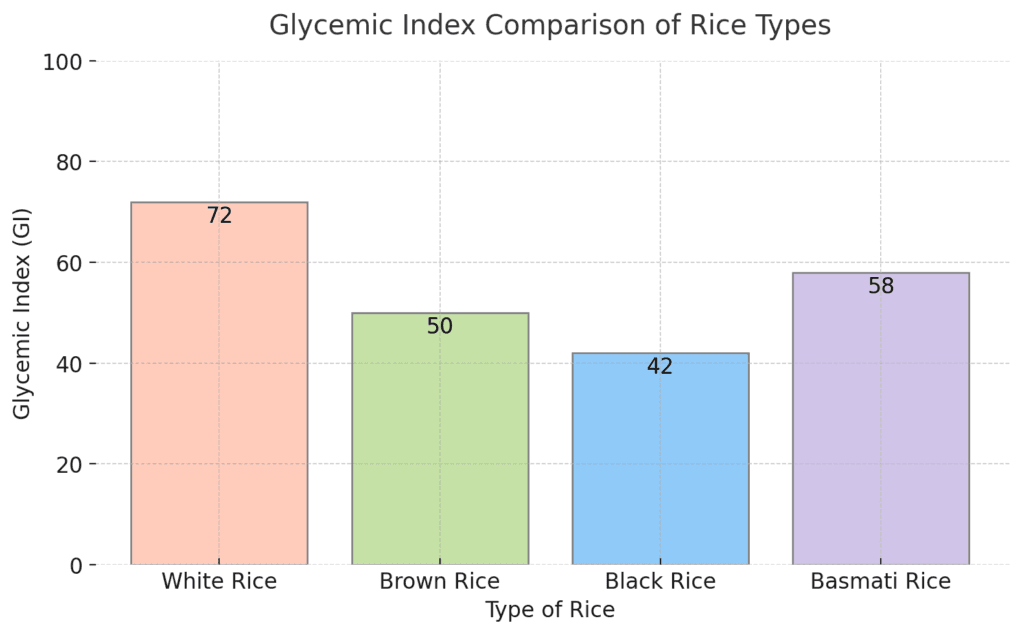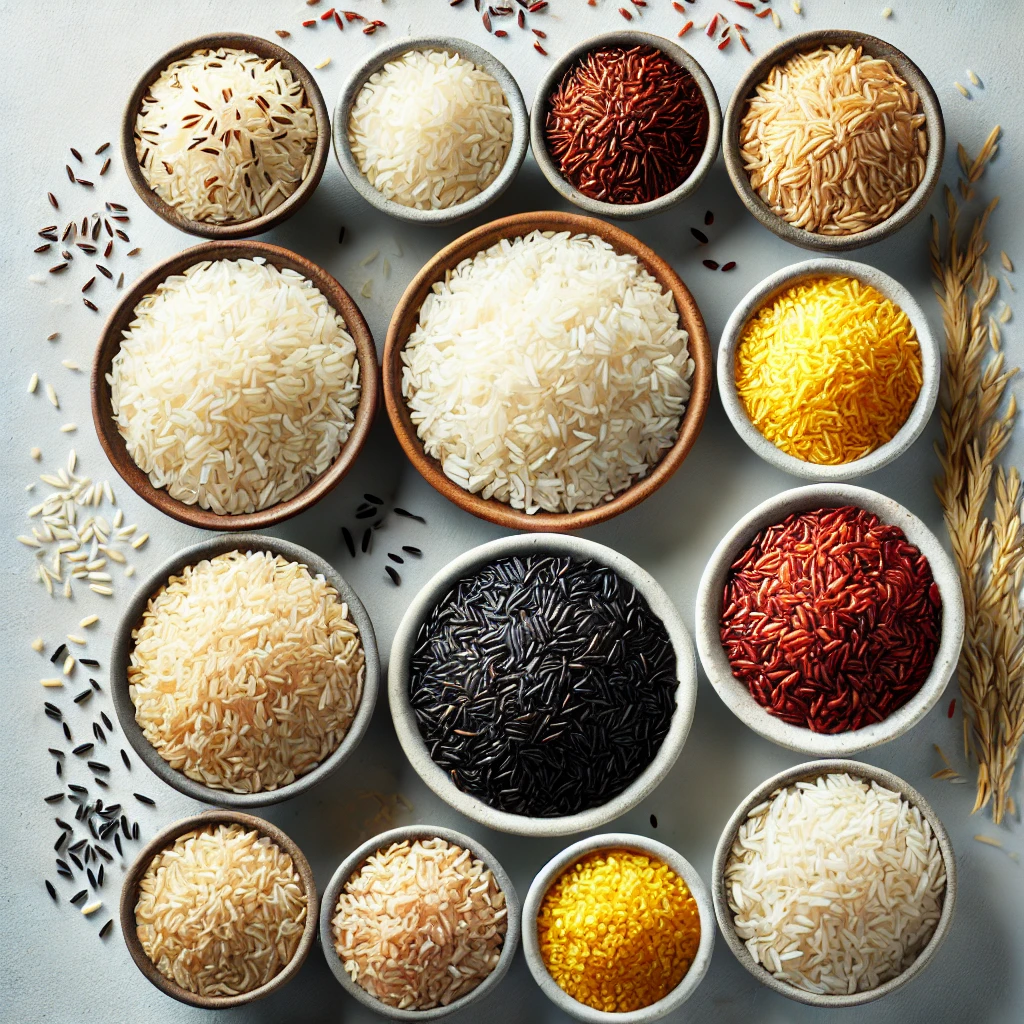When discussing healthy eating and weight management, rice often finds itself at the center of debate. Questions like “Does rice make you gain weight?” and “Is rice fattening?” are common concerns.
Rice is one of the most consumed foods globally and a staple for billions of people. However, there’s ongoing debate about whether rice contributes to weight gain or can fit into a healthy diet. This guide provides clear, evidence-based answers to help you understand how rice impacts your weight.
Understanding Rice: Varieties and Nutrition
Rice is a staple food for billions worldwide, featuring prominently in diverse cultural diets. The nutritional impact of rice largely depends on the variety and how it’s prepared.
Nutritional Breakdown (Per 100g cooked):
| Type | Calories | Carbs (g) | Protein (g) | Fat (g) | Fiber (g) | Glycemic Index (GI) |
| White Rice | ~130 | 28-31 | 2.7-2.9 | 0.3-0.4 | 0.4-0.9 | High (64–93) |
| Brown Rice | ~123 | 23-29 | 2.6-3.6 | ~0.9 | 1.5-1.8 | Moderate (~50) |
| Basmati Rice | ~120 | ~25 | ~3 | ~0.4 | ~0.5 | Moderate (~52) |
| Jasmine Rice | ~129 | ~28 | ~2.9 | ~0.5 | ~0.7 | High (~68–89) |
| Wild Rice | ~101 | ~21 | ~4 | ~0.3 | ~1.8 | Moderate (~57) |
Choosing the Right Rice for Weight Management
Whole-grain varieties (brown, wild, red, black) retain nutrients like fiber, protein, vitamins, and antioxidants. These varieties promote satiety, moderate blood sugar spikes, and offer greater overall nutritional value.
Does Rice Cause Weight Gain? Here’s What Science Says
The idea that rice directly causes weight gain is more nuanced than you might think. Several key studies have shaped our understanding:
- Whole Grain vs. White Rice: Regular consumption of whole grains like brown rice is consistently associated with better weight control and a lower risk of obesity. In contrast, refined grains (white rice) show a weak association with weight gain due to lower satiety and higher GI.
- Portion Control: A large Japanese study found high consumption of white rice linked to modest weight gain only in cases of excessive portion sizes. Normal, moderate portions showed no direct weight gain effects.
- Population Studies: Populations with high rice intake (like many Asian countries) have historically lower obesity rates, suggesting rice itself isn’t inherently fattening; the overall dietary context matters more.
The bottom line: Rice alone doesn’t make you gain weight portion sizes, type of rice, and your total diet do.
Rice, Blood Sugar, and Weight Management
The glycemic index (GI) indicates how quickly rice raises blood sugar levels:
- High-GI foods (like white rice, jasmine rice) cause rapid sugar spikes, potentially increasing hunger and overeating.
- Low-to-moderate GI options (brown rice, basmati, wild rice) help stabilize blood sugar, improve satiety, and reduce overall calorie intake.
If you’re managing weight or insulin sensitivity, selecting lower-GI rice varieties and pairing them with proteins, fats, and vegetables can significantly aid your goals.

Practical Guidelines to Include Rice in a Healthy Diet
You don’t have to give up rice to maintain a healthy weight. Here’s how to enjoy rice responsibly:
1. Opt for Whole Grains Often
Choose brown rice, wild rice, or basmati regularly to get extra fiber, vitamins, and minerals, helping you feel fuller and maintain stable energy levels.
Health experts recommend selecting whole-grain rice varieties like brown or wild rice to support heart health and weight control.
2. Mind Your Portions
- Recommended serving: ½ to 1 cup cooked rice per meal.
- Use smaller bowls to naturally limit portion sizes.
- Mix rice with vegetables or cauliflower rice to boost volume and lower calories.
3. Balanced Meals

Pair rice with:
- Lean proteins: Chicken, fish, tofu
- Vegetables: Aim for half your plate
- Healthy fats: Olive oil, avocado
- Legumes and beans to boost fiber and protein content
4. Cooking Tips
- Avoid frying rice in excessive oil or butter.
- Consider cooling and reheating rice to increase resistant starch, lowering its GI.
Common Rice Myths: Debunked
Let’s clear up some common misconceptions:
- “Rice always makes you fat.”
False: moderate portions of rice won’t cause weight gain. Excessive calories from any food cause weight gain. Although moderate rice intake isn’t typically linked with weight gain, research indicates that excessive white rice consumption might contribute to weight gain in certain contexts. - “White rice has no nutritional value.”
Misleading : white rice provides carbohydrates, some protein, and is often enriched with vitamins like folate and iron. - “Eating rice at night causes weight gain.”
Myth: the timing of rice consumption matters less than the total daily calories. - “Rice has no protein.”
Incorrect: rice contains about 2-4 grams of protein per serving, beneficial when combined with other protein sources. Ultimately, a balanced diet rich in vegetables, lean proteins, and healthy fats is the best approach for managing weight, as highlighted by global nutrition guidelines.
The Bottom Line
Rice can be part of a healthy, balanced diet. Focus on variety, portion size, and overall meal composition. Whole-grain rice varieties like brown and wild rice offer clear advantages for weight control and overall health. With mindful eating habits and balanced meals, rice isn’t your dietary enemy it’s a versatile ally in maintaining a healthy weight.

